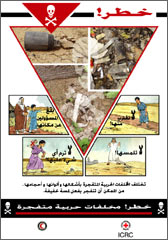Explosive Remnants of War in Iraq: "Stop! – don't go near them – don't touch them!"
25-06-2003
The term ERW describes a wide range of explosive munitions remaining in an area after the end of a conflict, a deadly threat to the population. Since the end of the conflict in Iraq dozens of victims have been reported in southern Iraq alone. The ICRC is taking urgent preventive action.

ERW awareness poster
The problem of explosive remnants of war (ERW) is acute in Iraq. The term ERW describes a wide range of explosive munitions remaining in an area after the end of a conflict. It includes everything from artillery shells, grenades, mortar and cluster bombs to rockets and missiles.
Johan Sohlberg, the ICRC's regional ERW adviser and a veteran of many conflict areas, considers the situation in Iraq the worst he has ever encountered: " Piles of ammunition, mines, small arms and weapons are littering the country. Most of them are in industrial areas but they can also be found in playgrounds, schools, construction sites and garbage heaps along the road.
They constitute a permanent threat to the population, especially children, who are unaware of the danger: they continuously come into contact with them, play with them and risk getting maimed or killed, " says Sohlberg.
As the number of victims increased, the ICRC recognized the urgent need to influence people's behaviour and attitude towards these deadly remnants of war. Hospital records in the southern governorate of Missan show that 7 2 victims were admitted in the first few weeks following the end of hostilities.
Along with the International Federation of Red Cross and Red Crescent Societies, the ICRC has launched an awareness campaign on mines and ERW and their deadly threat. Since May, information sessions have been organised, while posters and leaflets are being distributed to all Iraqi Red Crescent branches in southern Iraq – the most incident-prone part of the country. Announcements are about to be broadcast across the country through local radios.

Basrah. Abandoned ammunition store beside a football field.
ref. IQ-E-00078
" The main message we are stressing is: if you see something suspicious, Stop! Don't go near it; don't touch it; don't throw anything at it; and don't pick it up! " says Johan Sohlberg.
The first ICRC-sponsored training session took place in Baghdad and was attended by 20 Iraq Red Crescent volunteers. In Nasiriya, 40 Red Crescent volunteers were trained on effective presentation techniques, how to gather data and analyse facts and figures on victims and contaminated areas. In Amara, 25 volunteers attended a session on victim data collection.
Now 133 volunteers from the four southern governorates have the skills to make basic presentations to people in affected areas, to collect data and to report their findings.
The ICRC has been continuously providing reports on areas at risk from ERW to the UN's Area Mine Action Coordination Team; by mid-June 27 such reports had been handed over.